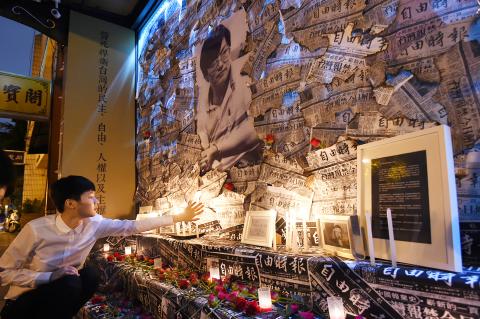The Executive Yuan yesterday announced that April 7 would be Freedom of Expression Day to commemorate the death of democracy activist Deng Nan-jung (鄭南榕), who died on April 7, 1989.
Premier Lin Chuan (林全) said that the democracy and freedom that Taiwanese enjoy is the result of past civil rights movements, and Deng paved the way for reform as his actions aroused public awareness of the importance of freedom of speech.
On April 7, 1989, Deng, then editor-in-chief of Freedom Era Weekly, set himself on fire as police attempted to break into his office after he had been barricaded inside for 71 days to avoid arrest after he was charged with sedition for the anti-government views expressed in his magazine, which published a draft “Republic of Taiwan constitution” in 1988.

Photo: Chang Chia-ming, Taipei Times
At the time, Article 100 of the Criminal Code banned the advocacy of replacing the Republic of China Constitution to mark the founding of a new nation, with those convicted liable to be sent to prison for life.
The article was amended in 1992, making it punishable only when such advocacy involves the use of violence.
President Tsai Ing-wen (蔡英文), when attending a ceremony to commemorate the 27th anniversary of Deng’s death in New Taipei City’s Jinshan District (金山) this year, said her administration would make the day Freedom of Expression Day to commemorate the activist, which had been one of Tsai’s election campaign pledges.
The designation and celebration of Freedom of Expression Day is to familiarize the public with the meaning of the freedom of speech, Executive Yuan spokesman Hsu Kuo-yung (徐國勇) quoted the premier as saying.
Government agencies, including the Ministry of Education and the Ministry of Culture, have been asked to organize celebratory events and commemorative programs to deepen public awareness of democracy, Hsu said.
Additional reporting by CNA

Alain Robert, known as the "French Spider-Man," praised Alex Honnold as exceptionally well-prepared after the US climber completed a free solo ascent of Taipei 101 yesterday. Robert said Honnold's ascent of the 508m-tall skyscraper in just more than one-and-a-half hours without using safety ropes or equipment was a remarkable achievement. "This is my life," he said in an interview conducted in French, adding that he liked the feeling of being "on the edge of danger." The 63-year-old Frenchman climbed Taipei 101 using ropes in December 2004, taking about four hours to reach the top. On a one-to-10 scale of difficulty, Robert said Taipei 101

Nipah virus infection is to be officially listed as a category 5 notifiable infectious disease in Taiwan in March, while clinical treatment guidelines are being formulated, the Centers for Disease Control (CDC) said yesterday. With Nipah infections being reported in other countries and considering its relatively high fatality rate, the centers on Jan. 16 announced that it would be listed as a notifiable infectious disease to bolster the nation’s systematic early warning system and increase public awareness, the CDC said. Bangladesh reported four fatal cases last year in separate districts, with three linked to raw date palm sap consumption, CDC Epidemic Intelligence

Taiwanese and US defense groups are collaborating to introduce deployable, semi-autonomous manufacturing systems for drones and components in a boost to the nation’s supply chain resilience. Taiwan’s G-Tech Optroelectronics Corp subsidiary GTOC and the US’ Aerkomm Inc on Friday announced an agreement with fellow US-based Firestorm Lab to adopt the latter’s xCell, a technology featuring 3D printers fitted in 6.1m container units. The systems enable aerial platforms and parts to be produced in high volumes from dispersed nodes capable of rapid redeployment, to minimize the risk of enemy strikes and to meet field requirements, they said. Firestorm chief technology officer Ian Muceus said

MORE FALL: An investigation into one of Xi’s key cronies, part of a broader ‘anti-corruption’ drive, indicates that he might have a deep distrust in the military, an expert said China’s latest military purge underscores systemic risks in its shift from collective leadership to sole rule under Chinese President Xi Jinping (習近平), and could disrupt its chain of command and military capabilities, a national security official said yesterday. If decisionmaking within the Chinese Communist Party has become “irrational” under one-man rule, the Taiwan Strait and the regional situation must be approached with extreme caution, given unforeseen risks, they added. The anonymous official made the remarks as China’s Central Military Commission Vice Chairman Zhang Youxia (張又俠) and Joint Staff Department Chief of Staff Liu Zhenli (劉振立) were reportedly being investigated for suspected “serious